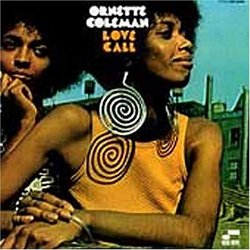| All Artists: Ornette Coleman Title: Love Call Members Wishing: 2 Total Copies: 0 Label: Blue Note Records Original Release Date: 1/1/2000 Re-Release Date: 1/5/1990 Genres: Jazz, Pop Style: Avant Garde & Free Jazz Number of Discs: 1 SwapaCD Credits: 1 UPCs: 077778435624, 0077778435655, 0724349460157, 077778435655 |
Search - Ornette Coleman :: Love Call
 | Ornette Coleman Love Call Genres: Jazz, Pop
|
Larger Image |
CD Details |
CD ReviewsAnother of Ornette's lessons nadav haber | jerusalem Israel | 03/20/2002 (5 out of 5 stars) "I believe the main lesson being taught by Ornette to the world has nothing to do with his "Harmolodic approach". The thing we learn from Coleman is to be ourselves. Here he uses Coltrane's rhythm section, but does not even remotely sound like anything but himself - starting a tune with a short riff, in unison with the tenor of Dewey Redman, then diving into an extended improvisation - playing with few limitations but with pefect control. The two versions of "Check out time" are an example to Coleman's truly free approach. The opening riff is basically identical, but where on the first version Coleman enters with bursting energy, on the second version the opening is followed by a Redman's long notes over a slowing rhythm. This gives the rest of the piece a whole different feel. On the Love Call versions Ornette plays trumpet and violin. While I prefer his alto playing, it is good to hear him explore the different sounds and possibilities. That's Ornette. His mind is always working, unbound by anything other than his own musical sensibilities. He knows his African American tradition - but is not limited by it or any other tradition. It is not easy for a musician to stray from a tradition - it is much easier to stay in the cozy confinements of an existing style/tradition. But the strong survive - as Coleman has." The Love is these calls is evident. DJ Rix | NJ USA | 12/14/1999 (5 out of 5 stars) "An excellent one, folks. Ornette holds on to Dewey & borrows Jimmy Garrison & Elvin Jones from Trane for more airborne excursions (see New York is Now!). The disciplined playing of Jimmy & Elvin keep the horns from wandering too far out in these riff driven compositions. & the album almost doubles in length from the LP release with two alternate takes & a bonus track. Ornette picks up his trumpet only once, & Dewey's playing is spiritually right on time. The Love in these calls is evident. Bob Rixon, WFMU" Simplicity Is a Rare Thing Dennis | Salzburg, Austria | 08/11/2000 (5 out of 5 stars) "With his milestone recordings of the late fifties Ornette opened the gate to a whole new world which is still being explored today as it will be tomorrow. While the original quartet with its Atlantic output is rightly regarded as his most important achievement, these two albums rank among his most successful and accessible work, as uncompromising as they are.The pieces contained in here are mostly simple, riff-based fragments, a basis for improvisation. But the "Broadway Blues" on the accompanying "New York Is Now"-CD is a fine example of Ornette the tunesmith. Writing an easy melodic line is often underrated or disregarded. But Ornette has always been a composer with the very rare ability to put it brief and,even more,to fill a lot of music into his pieces. These two CDs once more lay proof to the fact that his music is, besides all other qualities, lasting,i.e.it'll never get dated. One reason is, I suppose, evident here: Ornette knows his roots and is the born leader - giving his colleagues ample space to develop their own ideas and to contribute to the music in a vital way and yet making them to play HIS music. All musicians on these albums are in fine form and play with inspiration.Dewey displays his embodied tenor tone very pleasingly, Jimmy Garrison's bass supports and solos simultaneously and giant drummer Elvin Jones is a category of himself.I'd say that Ornette rarely played with so much power as when driven by Elvin.And despite this line-up no allusions to Trane creep up and go way into the music. Shortly after John Coltrane's death, a rather unexpected atmosphere. If simple were easy, why are there so few successors? The album covers are quite good too!"
|

 Track Listings (7) - Disc #1
Track Listings (7) - Disc #1